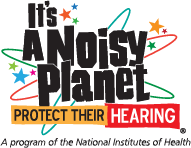Listen Up! Protect Your Hearing.
To protect your hearing, use earplugs — and try to avoid loud noises.
Noise (sound) is all around us — at school, at home, and all the places in between. It’s everywhere we go.
But being around too much loud noise, like at concerts or fireworks shows, can make you lose your hearing — and once it’s gone, you can’t get it back.
Did you know?
5 in 10 young people (like you) listen to their music or other audio too loudly
4 in 10 young people (like you) are around dangerously loud noises during events like concerts and sports games
48 million people in the U.S. have trouble hearing with one (or both) of their ears
The good news: You can protect your hearing — and still do all the stuff you love!
Check out this noise meter to see how loud different sounds are — and how you can protect your ears when you’re around them.
Loudness is measured in what’s called decibels (dB). Over time, any sound that’s 85 decibels or higher can cause hearing loss — or other hearing problems, like tinnitus (a ringing sound in your ears that won’t go away). The louder a sound is, and the longer you listen to it, the more it can damage your hearing.
Pick a type of sound to see about how loud it is, and get tips to keep your ears safe around noises at that level. You can stop hearing loss!
- 0 decibels
- Whispering
- Refrigerator
- Dishwasher
- Conversation
- Lawnmower
- Movie Theater
- Motorcycle
- Sports Events
- Headphones
- Rock Concert
- Sirens
- Fireworks
Choose a sound
0 dB
Pick a type of sound from the list to see about how loud it is.
Whispering
30 dB
Your secret is safe! This is totally fine for your ears.
The sound of your fridge humming
40 dB
Snack on! This is totally fine for your ears.
The sound of your dishwasher running
45 to 65 dB
This level of noise is safe for your ears. Go ahead and scrub the pots and pans while the dishwasher does its job!
Your normal talking voice at arm’s length
65 to 80 dB
Chat away! But if you have to yell so people who are nearby can hear you, watch out — the noise around you is probably too loud.
Lawn mower
80 to 100 dB
This level of noise can make you lose some of your hearing, so be sure to wear hearing protection. Store a pair of earmuffs near the mower, so it’s easy to remember to put them on!
A movie theater
70 to 104 dB
Seeing a movie on the big screen is fun, but it’s also loud — often, loud enough to make you lose some of your hearing.
To protect your ears, try to sit farther away from the speakers, and put in a pair of earplugs. Then sit back, relax, and enjoy!
Motorcycles
80 to 110 dB
You can lose some of your hearing after an hour on a motorcycle, so put in some earplugs (and put on a helmet!) before you ride.
Sports events (like a football or hockey game)
94 to 110 dB
You can lose some of your hearing in less than half an hour at a sports game, so be sure to pack some earplugs!
Listening to music with your headphones at the highest volume
96 to 110 dB
You can lose some of your hearing in just a few minutes when you’re using headphones at the highest volume.
To protect your hearing, turn it down to a lower volume. The music will still sound great!
Rock concerts, parties, or nightclubs
95 to 115 dB
You can lose some of your hearing after a few minutes at this noise level — so bring earplugs (the band is wearing them, too!).
And move away from the speakers — it’s even louder if you’re near them.
Sirens from a fire truck, police car, or ambulance
110 to 129 dB
You can lose some of your hearing in less than a minute if you’re near a police car, fire truck, or ambulance siren.
When you see one coming, get away from the noise if you can (for example, by rolling up your car windows). If you’re outdoors, you can also plug your ears with your fingers until the sirens are gone.
Firecrackers and fireworks
140 to 160 dB
Fireworks are a summer favorite, but they can seriously hurt your hearing. If a firecracker explodes near your ear, you could even lose all of your hearing.
To protect your ears, wear earplugs and make sure you’re a safe distance away from where the fireworks are being set off. Then enjoy the show!
Healthy Ear Fibers

Damaged Ear Fibers

Inside your ear, there are lots of tiny fibers that help you hear. Over time, loud noise can damage these fibers — and once they’re damaged, they can’t ever be fixed.
That’s why it’s so important to start protecting your ears now, while you’re young.
Most people don’t feel any warning signs (like pain or ringing in your ears) until their hearing is already damaged. And if you think your ears can just get used to the noise, think again. If loud noises don’t bother you as much as they used to, that means you’ve already lost some of your hearing.
So how can you tell when a noise is hurting your hearing? If there’s so much noise around you that you need to talk extra loud when your friends are only a few feet away, it’s probably hurting your hearing. Time to bring out the earplugs — or go somewhere quieter!
Don’t wait until it’s too late. Start protecting your hearing now!
Infographic courtesy of the CDC National Center for Environmental Health



